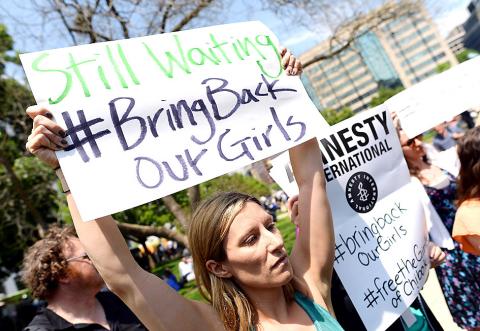The UN Security Council on Friday strongly condemned the abduction of hundreds of Nigerian schoolgirls, as the world body’s secretary-general dispatched an envoy to help find them.
The diplomatic moves came after Amnesty International said that Nigeria’s military had been warned of an attack on a school in which more than 200 girls were abducted by Boko Haram Islamists three weeks ago, but failed to act for nearly five hours.
The Nigerian military denied the allegation and has launched a round-the-clock search for the missing girls.

Photo: AFP
At least 10 army search teams were trying to track down the girls in the remote far northeast, border guards were on high alert and the air force had so far flown at least 250 sorties.
Nigeria is keen to demonstrate that it is finally acting to trace the 223 girls still missing, after three weeks where the teenagers’ parents and families accused them of inaction and indifference.
However, Amnesty’s allegations are likely to heap further pressure on Nigeria’s embattled government and military.
The unanimous UN Security Council declaration said the mass kidnappings “may amount to crimes against humanity” under international law, but made no explicit reference to charges in the International Criminal Court.
The 15 members of the council said they would follow the situation and consider “appropriate measures” to take against Boko Haram.
The statement urged their immediate release, without conditions.
Meanwhile, UN Secretary-General Ban Ki-moon announced he was sending special representative of the UN secretary-general and head of the UN office for West Africa, Said Djinnit, to Abuja to discuss ways of helping authorities locate the girls.
US, British and French experts have already arrived on the ground to help trace the schoolgirls.
Hundreds of people from the girls’ home town of Chibok, in northeastern Borno state, took to the streets of the state capital, Maiduguri, to vent their frustrations at the lack of immediate action.
At the same time, Nelson Mandela’s widow Graca Machel broke her customary mourning period to plead for the girls’ safe return.
Amnesty said that from 7pm on April 14, military commanders had repeated warnings about an impending raid in Chibok.
Two senior military officers said not enough troops could be found to head to the town to stave off the attack, as soldiers were reluctant to face guerrilla fighters who were better equipped.
Up to 200 armed Boko Haram fighters eventually abducted 276 girls at about 11:45pm after fighting a small number of police and soldiers stationed in the town.
Amnesty’s Africa research and advocacy director Netsanet Belay described the situation as a “gross dereliction of Nigeria’s duty to protect civilians,” adding that people remained “sitting ducks” for future attacks.
The girls’ kidnap and the threat by Boko Haram’s leader Abubakar Shekau in a video that he would sell them as slaves has triggered world outrage and a groundswell of calls for action on social networks.
US first lady Michelle Obama is to speak out against the kidnappings when she gives the weekly presidential address instead of her husband, the White House said on Friday.

Swedish campaigner Greta Thunberg was deported from Israel yesterday, the Israeli Ministry of Foreign Affairs said, the day after the Israeli navy prevented her and a group of fellow pro-Palestinian activists from sailing to Gaza. Thunberg, 22, was put on a flight to France, the ministry said, adding that she would travel on to Sweden from there. Three other people who had been aboard the charity vessel also agreed to immediate repatriation. Eight other crew members are contesting their deportation order, Israeli rights group Adalah, which advised them, said in a statement. They are being held at a detention center ahead of a

A Chinese scientist was arrested while arriving in the US at Detroit airport, the second case in days involving the alleged smuggling of biological material, authorities said on Monday. The scientist is accused of shipping biological material months ago to staff at a laboratory at the University of Michigan. The FBI, in a court filing, described it as material related to certain worms and requires a government permit. “The guidelines for importing biological materials into the US for research purposes are stringent, but clear, and actions like this undermine the legitimate work of other visiting scholars,” said John Nowak, who leads field

Former Nicaraguan president Violeta Chamorro, who brought peace to Nicaragua after years of war and was the first woman elected president in the Americas, died on Saturday at the age of 95, her family said. Chamorro, who ruled the poor Central American country from 1990 to 1997, “died in peace, surrounded by the affection and love of her children,” said a statement issued by her four children. As president, Chamorro ended a civil war that had raged for much of the 1980s as US-backed rebels known as the “Contras” fought the leftist Sandinista government. That conflict made Nicaragua one of

NUCLEAR WARNING: Elites are carelessly fomenting fear and tensions between nuclear powers, perhaps because they have access to shelters, Tulsi Gabbard said After a trip to Hiroshima, US Director of National Intelligence Tulsi Gabbard on Tuesday warned that “warmongers” were pushing the world to the brink of nuclear war. Gabbard did not specify her concerns. Gabbard posted on social media a video of grisly footage from the world’s first nuclear attack and of her staring reflectively at the Hiroshima Peace Memorial. On Aug. 6, 1945, the US obliterated Hiroshima, killing 140,000 people in the explosion and by the end of the year from the uranium bomb’s effects. Three days later, a US plane dropped a plutonium bomb on Nagasaki, leaving abut 74,000 people dead by the